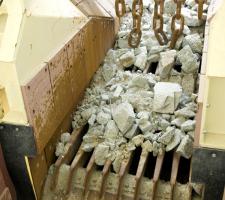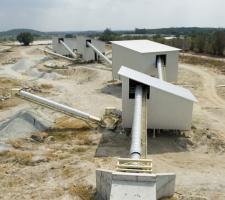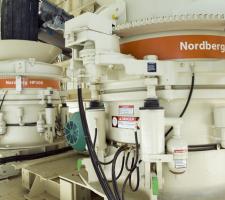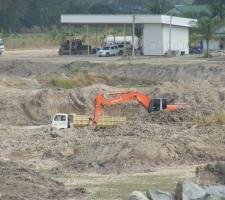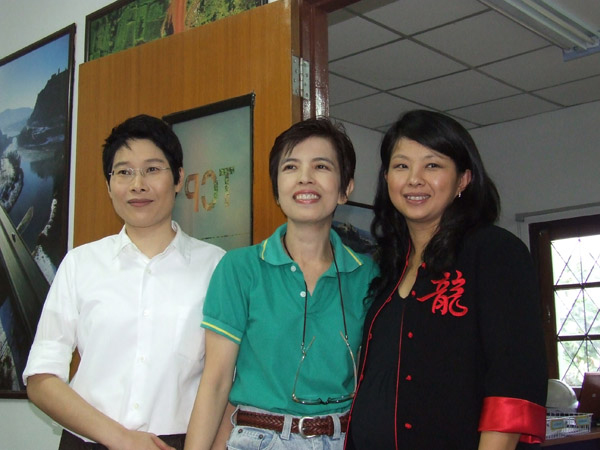
A new quarry in Thailand is setting higher aggregates industry standards in the country for efficiency and quality. Mike Woof reports
Thailand's fast growing economy means that there is a construction boom underway bringing with it increased demand for aggregates for use in construction of all types. To help meet this demand operators are looking for new extraction sites and also working to improve efficiency at existing quarries.
One the newest quarries to be opened in Thailand is Thai Crushing Plant's (TCP) 1million tonnes per year Chonburi quarry. Production at the site is benefiting from a new Metso Minerals crushing and screening plant, which is the most sophisticated of its type in the country.
TCP is a joint venture company owned equally by
The firm's brand new Chonburi quarry is 90km to the east of Bangkok and is well located to meet demand for stone in both the Bangkok and the local construction markets.
Quality TCP recognised that there was a demand for good quality stone in the area and identified the Chonburi location as showing good potential for a quarry. The deposits at the site were evaluated using seismic testing, followed by drilling to verify the initial results.
According to TCP general manager Apapat Kositpatana, the company started buying the land in 2005 and that overburden removal began in early 2006. Around 1million tonnes of overburden had to be moved to develop the site, comprising mainly soil and this was sold for use elsewhere.
The quarry and the area surrounding it sits on the site of lava flows and the rock is hard granite although it is not a particularly abrasive grade. There are 30 years of reserves at the site based on a planned production rate of 1million tonnes per year and the concession zone covers an area of 100ha. "We have an agreement to operate the Chonburi site for 25 years," Kositpatana said.
When setting up the new quarry, TCP's priority was to produce high quality stone cost effectively and efficiently, while also minimising the environmental impact of the quarry. Previous good experience with plant selection at TCP's Pranburi quarry helped to influence the choice at Chonburi.
TCP has been a long term Metso customer as it uses a Metso static plant at its Pranburi quarry, as well as having a mobile plant that has run successfully at its smaller Krabi quarry.
The Pranburi quarry is 250km from Bangkok and produces some 800,000tonnes of stone per year, while TCP's Krabi quarry is 120km from Phuket in the south of the country and produces around 350,000tonnes of stone per year.
When TCP began planning the new Chonburi quarry, the fact that the Metso equipment at the firm's Pranburi site has provided good uptime, low downtime and a consistent productivity since it was installed in 1997 practically sealed the deal for the new plant. Kositpatana said, "It's been very reliable."
New benchmark Crushing and screening plant design and engineering was carried out by Metso Minerals Systems at Macon in France while project management was handled by Metso's local team in Thailand. The steelwork and conveyors were built by local firm Thai Rung United Engineering (TRUE) to specifications set out by Metso. Considerable support also came from Metso's Thai distributor, Uawithya Machinery Company, which is providing servicing and maintenance for the plant. Kejkanoek (Kay) Uawithya, managing director of the family run firm Uawithya, said, "We will open a new service centre opposite the Chonburi quarry to support TCP." During the development of the quarry, a
In addition, TCP has a Caterpillar 320 excavator fitted with a Furukawa 15G breaker that was used during the development of the quarry and which is staying on site to handle secondary breaking work.
Around €6million has been invested in the quarry, with a healthy portion having been spent on the crushing plant. The new Chonburi crushing plant was commissioned in November 2007 and is designed to produce around 350tonnes per hour of rock, using a similar configuration to the stationary Metso plant at TCP's Pranburi site.
However the new Chonburi quarry benefits from numerous technical advances in crushing technology since the Pranburi site became operational in 1997. Uawithya said that the new Chonburi plant sets a precedent for Thailand's quarrying industry, "I think this is a world class crushing plant. The investment TCP made is very high." To ensure it operates efficiently, the plant is run by a PLC automation system and this allows the entire crushing and screening process to be controlled by a single operator. This level of technology is widely used in Europe or North America but is new to the developing Thai aggregates market. The sophistication of the crushing and screening plant is allowing the quarry to produce a wider array of different stone sizes than other Thai quarries, which tend to produce three to four stone sizes only.
The end product fractions are conventional, 0-5mm, 5-10mm, 10-15mm, 15-20mm and 20-25mm, although a 50mm road base material can also be produced if required.
Ex quarry, TCP is able to market this good quality stone for around THB150 (€3.20) per tonne.
Of the 1million tonnes per year produced, 30% is expected to be sold to the 20 or so concrete batch plants close to Bangkok. Another 30% will go to the asphalt plant owned by sister company Thai Slurry Seal (TSS), which is also a 50/50 joint venture jointly owned by Colas and the Supsakorn family. Aggregate for road construction will account for another 30% of Chonburi's market and the remaining 10% will provide local contractors with material for general construction.
The site is in a good location as it is relatively close to Bangkok's new airport as well as to a large new leisure complex being built, which is using some of the stone from the site for road building and general construction. Uawithya commented, "There's quite a lot of foreign investment in the area."
Expansion opportunities There are other similar reserves of rock in the area beyond the current consented extraction site and there is little in the way of housing close to the quarry at the moment. Kosipatana added that it may be possible to renegotiate the concession at the end of the 25 year period and establish a new quarry nearby, but that this is all well in the future.
Kositpatana said that TCP takes care to minimise the impact of its quarrying operations and that the firm's Ponburi quarry has received praise in this respect. She said, "We are environmentally friendly and we won two awards from the mining department for good pollution control." Every effort is being made to ensure that the new Chonburi quarry will follow the lead set by the Ponburi operation. TCP is taking care to minimise the noise, vibration, dust and flyrock from blasting operations and is keen to ensure that its blasting operations are efficient, with a minimum of fines production and a minimum of oversized material requiring secondary breaking. This will help keep costs down, as well as ensuring that the quarry is cost effective.
The blast design requires blastholes drilled to depths of 9m using 76mm diameter holes and each pattern uses 20 holes in all. The explosives, supplied by Uawithya, are stored on site in specially constructed facilities that are kept under close guard for security.
When the site ramps up to full operating capacity blasting will be carried out four times a week, with each blast expected to yield around 10,000tonnes of rock. To further minimise dust emissions from the quarry, the trucks leaving the site go through a wheel washer while the loads are also sprayed to prevent dust from spreading.
The quarry is being operated on an eight hour day shift, six days a week and the drilling and blasting is being carried out by a specialist contractor, which runs two Furukawa HCR9 top hammer rigs.
For loading TCP is using two
The hauling is carried out using a fleet of five 20tonne capacity on-highway Nissan trucks. Kositpatana said that these offer considerably lower running costs in terms of tyres and fuel than purpose-built off-highway trucks, which the company uses at its Pranburi quarry.
The rock blasted at Chonburi ranges from 0-700mm in size and after loading and hauling, the material is scalped a TK series scalper before being fed by a VF series vibrating feeder into the plant's Metso C125 primary jaw crusher.
Ultrasonic level sensors are fitted to the hopper feeding the primary crusher (and throughout the entire crushing and screening plant) to ensure that material flow remains at optimum. This is an important point as it helps ensure good productivity from the plant, while reducing the risk of blockages caused by overfeeding or wasting power when the crushers run empty.
To further ensure material flow into the primary crusher is continuous, it has a large hopper and Sompong Sooksa-nguan, Metso's bid manager for Asia added that it has a capacity of 60m3, compared with the 35-40m3 hoppers fitted to most plants of a similar size. The C125 primary crusher has quarry jaw profiles and features a closed side setting of 130mm and is also the most sophisticated unit of its type in the country. Sooksa-nguan said, "This is the first crusher in Thailand with hydraulic adjustment." This hydraulic feature slashes the time required to adjust the crusher from two to three hours to just two minutes and can be carried out by a single technician rather than three needed for earlier generation equipment with manual adjustment. Because the primary crusher sits on rubber pads it generates comparatively little vibration, which means that its purpose-built 160kW motor is mounted directly, reducing the length of the belt drives and increasing its efficiency.
After the primary stage, material is fed through a CVB1845 inclined screen that separates the material into 0-25mm and 25-70mm sizes. Coarse material is directed to the HP300 secondary cone crusher while the smaller stone goes to the HP300 tertiary cone crusher, with the latter set to a standard fine crushing profile. The secondary and tertiary crushers have settings of 40mm and 18mm respectively and are both fed by 20m3 hoppers.
The TS303 triple slope screening plant is another first for Thailand and this unit has a comparatively small screen area. Metso regional manager Suhen Agarwal said, "It sits on rubber mounts and is fully encapsulated to keep the dust in." The quarry's stockpiling capability has been maximised due to TRUE's installation of 25m long output conveyors that have a tail end height of 8m and are able to slew through 120º. Good material flow is ensured throughout the plant, with large reserves at key points in the chain as well as big stockpile areas throughout the system. The level sensors play an important role according to Sooksa-nguan, "...to ensure that the crushers are kept full all the time." Sooksa-nguan pointed out that all of the conveyors are built to a high specification, featuring high quality Interrol rollers with sealed bearings for reliability and longevity as well as rubber seals throughout to further minimise dust emissions. Overload protection is fitted on the conveyors to prevent problems of material build-ups, while emergency stops are installed throughout the plant to ensure safety. Should an emergency stop device trip-out, the plant operator can identify its location immediately from the control cabin.
To further maximise safety, interlocks are installed at key points in the plant and if maintenance is being carried out at any stage, these can only be reset manually and not from the control cabin. Sooksa-nguan said, "The motors can tell you how much current they are drawing. The system identifies if they're taking too much current because there are upper limits set." Health and safety as well as environmental issues have played a part in the way this quarry has been designed, as these factors are taking greater precedence in the Thai market. Effective dust encapsulation has been used on all of the conveyors both to minimise material spillage and dust emissions.
This latter factor is one that the Thai authorities are keen to encourage quarrying operations to address, having introduced more rigorous regulations in recent years. Rick Mulready said, "We went the whole distance and then some to ensure we achieved full dust encapsulation. It's a requirement from the ministry now."
Energy efficiency Meanwhile, to ensure the facility's cost effectiveness, Metso has played a good deal of attention to its energy consumption.
Uawithya said, "At the moment we have problems with fuel costs in Thailand." She said that the price of diesel has increased 50% in the last two years (diesel costs around BHT30 (€0.65) per litre at present in Thailand).
Luckily, electricity prices have not risen so fast but other inflation costs have encouraged Thai businesses to be as economical as possible even in growth, which is why the technology being introduced in this new Metso plant marks such a significant step for the country's quarrying industry. Uawithya said, "Energy costs have been a key factor in Thailand to reduce energy consumption. I think everyone is becoming very aware of this cost these days." The Chonburi site uses around 1.5kW per hour of electricity to produce 1tonne of crushed stone. This compares favourably with other operations in the country. Uawithya said that the latest generation technology Metso has installed at the Chonburi site will help reduce TCP's running costs by comparison. "The other quarries in Thailand consume a lot more electricity. There are around 250 quarries in Thailand now, producing 50 million tonnes per year," Uawithya said.
She said that Metso has a good share of the Thai crushing market, with around 170 units in the country at present. She added that before the economic crisis of a few years ago, there used to be some 500 quarries in Thailand, although many of these were smaller and less efficient operations.
The growth potential in Thailand's quarrying sector is strong and further sales of crushing plants are likely, with Metso in a good position to capitalise through the perceived value of its premium quality plants and its distributor's experience of the industry. Uawithya said, "Over the next five years we're talking about 200 units." Uawithya made the point that Thailand's economic growth has made it the target of major investment from large overseas companies.
She said that several major quarrying firms are now investing heavily in Thailand and these include Colas,


